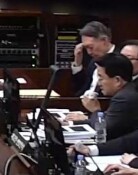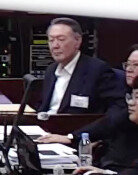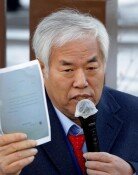Fraud Puts Finance Institute in Crisis
Fraud Puts Finance Institute in Crisis
Posted February. 17, 2006 03:11,
The Korea Institute of Public Finances (KIPF) is in crisis after the revelation that it forged a document after managing government projects poorly in order to get more budget money.
The state-run research institute has a track record of public criticism after bringing in an unqualified former minister as a guest researcher and punishing a researcher who was critical of government policies.
Budget Waste-
In December 2005, P, a worker at the KIPF reported the KIPF to the Korean independent corruption commission.
He reported that the KIPF was wasting budget money and that the issue should be investigated because it was not redressed even after the Board of Audit and Inspection of Korea (BAI) pointed out the waste in a 2001 audit. The report was recently transferred to the BAI.
According to the audit report, the KIPF received a tax and financial information database project worth 4.96 billion won from the Ministry of Information and Communication in June 1999.
The project called for the creation of a 60,000-page database made up of five categories, including tax laws of nations, foreign literature, general information, statistical reports, and an article index.
It turns out that the KPIF generated less than 10,000 pages of data, including about 2,000 pages that were just a reiteration of Koreas tax law, which required no translation or analysis.
In April 2000, however, the KIPF submitted a confirmation document that the institute had finished work on the five databases. A working-level researcher forged the official seal of the head of the institute.
The BAI pointed out that the KIPF and National Computerization Agency (NCA) should punish those who were responsible, and supplement the project or return the project fee. But all the KIPF did was to prosecute the researcher who forged the seal and issue a warning to the other researcher who was responsible.
The KIPF argues that because the rights to the databases are held by the NCA, it is too late to supplement the databases.
Sohn Won-ik, the director of the department of research coordination at the KIPF, explained, In four categories, except for the tax law database, the amount of data established was more than the original goal. Therefore, personnel expenses were legitimately spent.
However, Song Hyung-bum, the commissioner of the public research labor union, pointed out, The KIPF should show its willingness to rectify the situation
A Problematic Personnel System-
There have been seven guest researchers at the KIPF since 2004. Four of them were former senior public officials, including a former minister, vice minister, and director.
Most of the guest researchers failed to complete their research during their term, which made other researchers complete their reports late.
The KIPF became a subject of gossip in January 2005 when it invited Huh Sung-kwan, the former minister of government administration and home affairs, to work for it as a guest researcher.
Another researcher, who criticized government policy, was punished.
Roh Young-hun, a researcher who published an article criticizing the 8/31 comprehensive real estate policy in November 2005, was suspended from doing research for a year.
At the outset of 2006, Choi Yong-sun, the head of the KIPF, stopped Roh from presenting the article at a seminar within the institute and blocked the article from being released to the public. The institute also blocked a report release in 2001, which criticized government public fund management.
legman@donga.com







